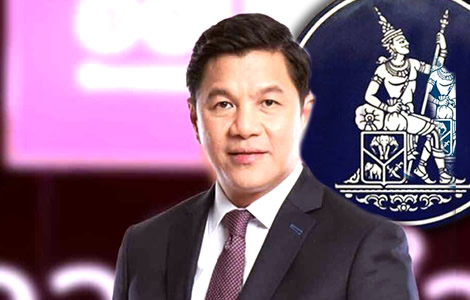Vitai Ratanakorn, President of Government Savings Bank and advocate for low-cost loans to the less well-off, is tipped to become the next Bank of Thailand governor. His appointment was delayed by paperwork, but is now expected when the cabinet meets next week.
The President of the Government Savings Bank is poised to take the helm at the Bank of Thailand when the cabinet meets next week. Mr. Vitai’s confirmation was delayed on Tuesday over paperwork—but his appointment now looks inevitable. A veteran of frontline banking with a focus on low-cost lending to the underprivileged, his selection points to a sharp shift in direction at the heart of the central bank.

Vitai Ratanakorn, President of the Government Savings Bank (GSB), is expected to become the next governor of the Bank of Thailand. Although the cabinet has yet to decide officially, strong reports suggest his nomination is almost certain.
The decision was initially expected at today’s cabinet meeting. However, due to a paperwork delay, the nomination will now be made next week. Finance Minister Pichai Chunhavajira confirmed the delay and insisted it was only procedural.
“I sent the paperwork a bit late,” he said. “As this is an important position, the cabinet needs time to review it.”
Vitai’s nomination delayed by paperwork but confirmation expected after cabinet meets next week
Nonetheless, Pichai stated firmly that the nomination will be submitted for cabinet approval at the next meeting. According to him, the delay does not reflect any problem with the nomination process.
The new governor will replace Sethaput Suthiwartnarueput, whose term ends on September 30, 2025. Sethaput has served five years and is stepping down at the end of his term. Once appointed, Vitai will need cabinet and royal approval to begin his five-year term on October 1.
The Ministry of Finance has made clear that Vitai is the preferred candidate. According to sources, his leadership at GSB gained attention for helping vulnerable groups access credit. Moreover, he played a key role in addressing Thailand’s public debt problems. His policy approach, described as pragmatic and inclusive, resonated with decision-makers.
On June 24, the Bank of Thailand Governor Selection Committee narrowed the field to two candidates. Those selected were Vitai Ratanakorn and Roong Mallikamas, the Deputy Governor responsible for financial institution stability.
Finance Ministry backs Vitai after shortlisting process narrows field to two candidates for top BoT role
Both candidates were interviewed and presented their visions to the finance minister. Yet Vitai, despite being the last to apply, quickly emerged as the frontrunner.
Crucially, his reported support from former Prime Minister Srettha Thavisin and Finance Minister Pichai helped cement his position. Both are seeking a central bank leader more aligned with the government’s economic priorities.
Over the past two years, relations between the central bank and the Pheu Thai-led government have grown tense. A major point of conflict is interest rate policy. The government wants to see lower rates to stimulate economic activity. In contrast, the central bank has focused on preserving financial stability and resisting political pressure.
As a result, the divide has grown increasingly visible. Policy differences have sometimes spilt into public view, creating confusion and concern among business leaders.
Nonetheless, government insiders believe Vitai could ease tensions. His leadership style is described as collaborative, and he is seen as someone open to economic reform.
Vitai seen as a bridge-builder as cabinet seeks alignment between central bank and economic priorities
According to a senior finance ministry official, the government wants a governor with a “fresh, flexible vision.” They want someone who will “support the real economy” and consider a more accommodative monetary policy.
Vitai is known to support lower interest rates, particularly during times of economic distress. At GSB, he expanded access to low-cost loans, especially for lower-income groups and small businesses. His experience is viewed as highly relevant during a period of economic uncertainty.
Thailand’s economy faces several key challenges. Consumption remains weak, household debt levels are high and export sectors are under pressure. Moreover, the banking sector is seeing declining profitability and worsening asset quality.
Part of the strain comes from a credit crunch triggered by tighter monetary policy. The central bank has resisted cutting rates, citing inflation risks and the need to protect financial system stability.
Government wants fresh vision as Vitai’s loan record matches concerns over fragile Thai economy
However, with structural problems mounting, critics argue the BoT’s stance may be too rigid. As a result, the choice of governor could determine whether the BoT adapts to new economic realities.
Despite this urgency, the selection process has faced criticism. By regulation, a new governor should be appointed 90 days before the current term ends. That deadline has already passed. Yet, the law does not include any penalties for missing it.
Still, some observers worry the delay reflects deeper coordination problems. Siri Ganjarerndee, former assistant BoT governor and now chairman of Tris Rating, urged caution.
“In my opinion, the government and central bank must work together more closely,” Siri said. “Differences should be resolved privately, not in public.”
He warned that visible disagreements send the wrong message. They risk undermining confidence among both investors and the public. According to Siri, unity in economic leadership is essential, especially during periods of volatility.
“Disagreements should lead to discussion, not confrontation,” he said. “Thailand cannot afford to waste resources on infighting.”
Former BoT official urges unity as delay in appointment fuels concern over coordination and messaging
Going forward, the next BoT governor will play a crucial role in shaping economic recovery. The global backdrop remains uncertain. US tariffs are the new threat, inflation pressures persist and policy space has narrowed.
If confirmed, Vitai will face immediate challenges. He must balance the demands of a government pushing for stimulus with the bank’s mandate for stability. Additionally, he will need to rebuild trust between the government and the central bank after years of tension.
Bank of Thailand expert warns that Thailand must be prepared for Trump tariff impacts and uncertainty
Finance Minister to hold critical talks with Bank of Thailand Governor on US holding before he flies out
Bank of Thailand responds to Thaksin’s idea to buy bank debt and give borrowers a second chance
Still, many see his appointment as an opportunity. His background in public banking and social finance gives him unique insight into grassroots economic issues. Moreover, his reported openness to innovation could modernise the central bank’s approach.
In the end, the cabinet’s decision—expected next week—will shape the economic direction of Thailand in the medium term. All eyes are now on Government House as the country waits for the official confirmation.
Join the Thai News forum, follow Thai Examiner on Facebook here
Receive all our stories as they come out on Telegram here
Follow Thai Examiner here
Further reading:
Commerce Minister meets US trade boss Jamieson Greer in Korea. Paul Chambers case still dogs talks


















